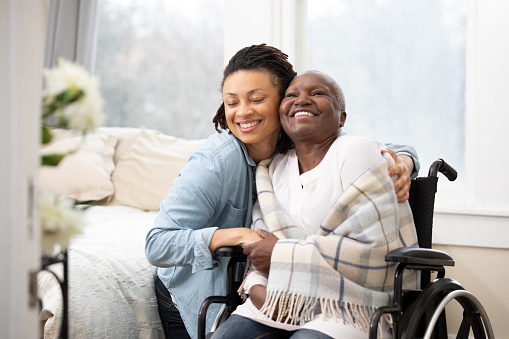
Most of us have to face the sobering fact that we will one day be a caretaker to a loved one. Either because of a sudden illness, age or a critical disability, being thrust into the role can be extremely overwhelming if not prepared.
We’ve gathered a few key tips that can help caretakers not only provide support for their loved ones, but themselves as well.
1. Start talking about caregiving now
It’s always great to start talking to your loved ones about their care contingency plans early on. For example, adult children might want to have these conversations around the time their parents turn 70, even if they aren’t showing signs of slowing down. Ask them what their preferences are if they fall ill. Is this something they’d like to take care of in-house? Would they like to live with you, or perhaps a senior center would best fit their wants and needs. No one wants to talk about it. But for the betterment of you and your loved ones’ future, you have to.
2. Talk to others who’ve done it
There are lots of tough questions that come along with becoming a caregiver. How do you properly take care of a grown adult without taking away their sense of agency? How will you structure their daily diet plan? Will you allow them to drive? They are daunting but luckily you can get some real answers. There are many local resources that offer insight into how caregivers can provide the best support for their loved ones and themselves, like the Red Cross, the National Family Caregivers Association, or the local Area Agency on Aging. There are also often classes in caregiving at community centers that could help out significantly. Also, think about consulting a geriatric caseworker who can properly assess challenges.
3. Prioritize your own support
It’s very important to start building a support community almost as soon as you know you are about to be a full-time caregiver. Facebook or Groupme support groups for caregivers are a great way to vent, gain and give advice for what can be a very isolating situation. They also offer a way for you to create a supportive audience for running tough decisions before having to make them. Another way to find them is to ask your doctor's office, local hospital or caregiving organization.
4. Get help when you need it
It does more harm than good to put your own health on the backburner when you’re providing care to someone else. Loop your family into what is going on and ask them about ways they can help you with the workflow. Also, it may be worthwhile to explore part-time assistance programs from local facilities, even if it’s for a few hours per week. If that’s not an option because of your budget, you may want to reach out to volunteer organizations that provide free services.
5. Consider senior care facilities as a lifeline
If your loved one has expressed a desire to either live with you or continue to live on their own with healthcare assistance, it may be worth considering a senior care facility if you know those options aren’t realistic. Even if your loved one thinks they will be better off without it, a senior care facility should not be left off the table, if not only for their care but for your mental health. Just be cognizant of where you choose to place them. Thoroughly research reviews, violations, licensing and even name changes, which often signals business issues. We also advise that you talk to those who have admitted a loved one about their experience and set up a tour for yourself. Lastly, it might be best to reach out to any local reporters who have experience in investigating nursing home abuse and gauge from there.
We hope these tips help. Remember, you’re not in this alone.








